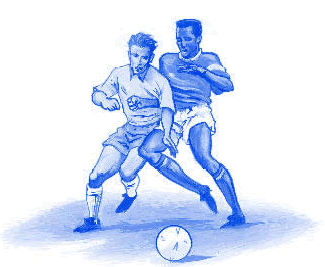October 10, 2005
Did which-hunting change the Laws of the Game?
 Jim Gordon pointed out by email that the 2005 Laws of the Game (LOTG), as published by Fédération Internationale de Football Association (FIFA), include one provision that is incoherent in its English version (p. 40 of the .pdf):
Jim Gordon pointed out by email that the 2005 Laws of the Game (LOTG), as published by Fédération Internationale de Football Association (FIFA), include one provision that is incoherent in its English version (p. 40 of the .pdf):
Law 12 - Fouls and Misconduct
Decisions of the International F.A. Board
Decision 4
A tackle, which endangers the safety of an opponent, must be sanctioned as serious foul play.
As Jim observes, the commas after "tackle" and "opponent" turn an integrated or restrictive relative clause, referring to those tackles that are safety-endangering, into a supplementary or nonrestrictive relative clause, referring to all tackles. (For us Americans, this is about soccer, where tackles lack the sacramental status they have in American football, but are still a legal and even routine defensive technique.)
As evidence that what the English text says is not what FIFA means, Jim offers the versions in Spanish and in French:
Una entrada que ponga en peligro la integridad física de un adversario deberá ser sancionada como juego brusco grave.
Un tacle qui met en danger l’intégrité physique d’un adversaire doit être sanctionné comme faute grossière.
Could this be an example of what we might call "type 2 which-hunting"? In the commoner form of which-hunting, certain copy editors change which to that in restrictive relative clauses. An alternative method of enforcing this spurious "rule" would be to add commas around every which-clause, regardless of its meaning. There is some evidence that this principle has been applied unsystematically throughout the English version of the LOTG, since we have e.g.
(p. 15) In competition matches, only footballs which meet the minimum technical requirements stipulated in Law 2 are permitted for use.
(p. 33) Only procedures to determine the winner of a match, which are approved by the International F.A. Board and contained in this publication, are permitted in competition rules.
Another possibility, I suppose, is that the English versions of certain parts of the LOTG were written by a native speaker of German. FIFA renders the corresponding decision about tackling in German as:
Ein Tackling, welches die Gesundheit eines Gegners gefährdet, ist als großes Foul zu ahnden.
I wonder what the English wording of this decision has been across the various editions of this document.
[Update: Bertil van Zweeden has the textual facts:
According to a memo from the US Soccer Federation, the rule was created in 1998 in the following form:
"A tackle from behind which endangers the safety of an opponent must be sanctioned as serious foul play." Before, such tackles from behind were not explicitly mentioned in the rules (although in practice, players often got a punishment for them). Here is the memo:
http://www.kenaston.org/ussf/memo1998i.htm
Note that here is discussed if every tackle from behind should be punished.
In this '99 memo from the US Soccer Federation, the comma is introduced:
http://socref.net/docs/USSF%201999%20Memorandum.pdf
So, your hypothesis about an alternative form of which-hunting was probably correct.
In 2005, the "from behind" part was skipped:
http://socref.net/docs/USSF%202005%20Memorandum.pdf
However, I couldn't find any official FIFA memoranda on this rule.
My native Dutch is up there with English: all tackles should be punished in our football :) . Bad idea, if you ask me. The matches are already interrupted too often by the man in the black shirt.
]
[Update #2: Steve Jones suggests
You can blame it all on Microsoft Word (Geoff will no doubt be overjoyed to hear that!).
Put the offending clause, with 'which' and without the commas into Word 2000, and its grammar checker will underline it in green, and suggest you put in the commas or change 'which' to 'that'. Understandably, the grammatically illiterate choose putting in the commas as the lesser evil.
MSWord does act that way, but I doubt that this is a source of joy for Geoff Pullum, who would no doubt be happier if all grammatical advice, from whatever source, were valid. ]
Posted by Mark Liberman at October 10, 2005 11:40 PM